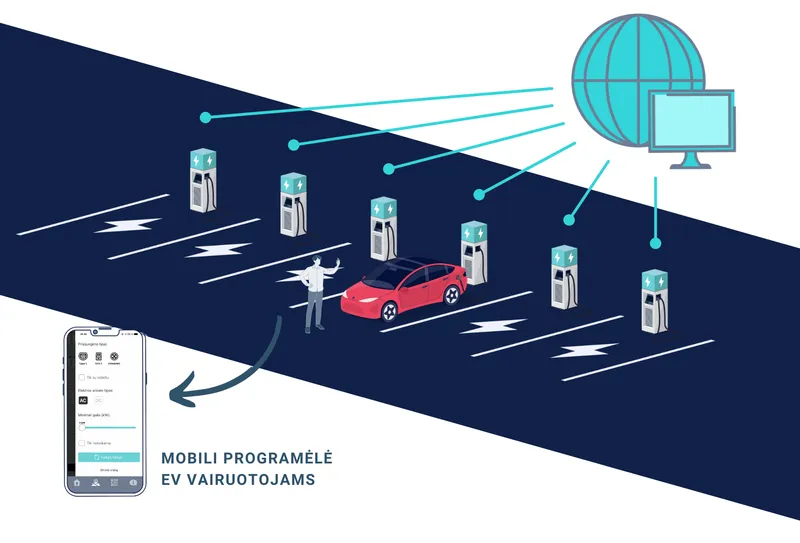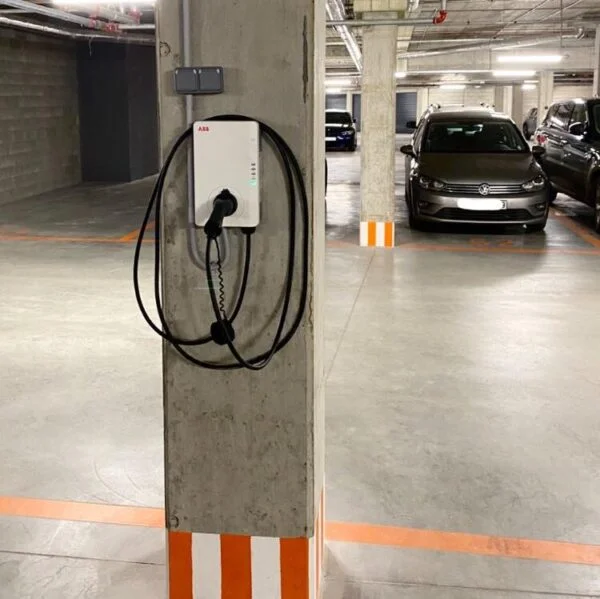Pagrindinis » A breakthrough in EV charging infrastructure: convenient charging of an electric car in an apartment block

Today, electric cars are seen as innovative vehicles that not only help to reduce air pollution efficiently, but also save significant amounts of money. According to official data from Regitra, in 2021 there were 2,489 pure EVs registered in Lithuania. In 2020, 1,184 were registered, and in 2019, just 529. Although the rapidly growing number of registered EVs each year reflects people’s changing attitudes towards electric cars, many people are still reluctant to buy an EV. One of the main reasons for this is the limited infrastructure, which makes it difficult to charge EVs in parking lots of apartment buildings.
The rapid development of the EV market and the popularity of this type of vehicle are also helping to create a range of companies providing EV infrastructure services, which are introducing innovative solutions to make the operation of EVs much more accessible, even for apartment dwellers.
While the number of apartment dwellers wanting to get behind the wheel of an electric car is growing every year, many of them face a number of problems that make it difficult to install their own charging stations in apartment car parks. These days, residents who want to install their own EV charging station in apartment car parks have to connect it to the electricity meter of the apartment, and in many cases, the capacity of the electricity supply itself has to be increased as well. Increasing the capacity of the electricity supply allows a certain amount of sub-optimal electricity to be reserved, which can be used by drivers of electric vehicles to charge their electric cars.

According to estimates based on the prevailing trends in the European Union, electric cars with an average daily range of 40 km and an average electricity consumption of around 20 kWh/100 km are charged at home about every fourth night. This means that the electricity reserved for the rest of the time is not used efficiently. The wiring needed to install a charging station from electricity meters is also often very difficult.
The wiring needed to install a charging station from electricity meters is also often very difficult. Normally, such cabling can only be carried out with the necessary permits, and sometimes cabling is not possible at all due to various technical obstacles, such as the presence of a parking space in the territory of another apartment block.
The most effective way to facilitate the deployment of charging stations for electric vehicles in multi-storey car parks is nowadays considered to be a rental service. According to P. Gūžis, the head of the company “Įkrautas”, which takes care of the infrastructure for electric vehicles, the service of renting charging stations for electric vehicles not only helps to avoid the work of connecting the station to the individual electricity meter, but also allows to efficiently optimize the use of the electricity available in the reserve and to allocate it to the recharging of electric vehicles. In short, the main objective of this rental service is to charge as many electric vehicles as possible, making optimum use of the building’s existing electrical capacity.
However, despite the centralisation of EV charging stations and their connection to common meters, most apartment blocks have limited power reserves, which can easily be exhausted if a larger number of EVs are charged at the same time. In this case, a dedicated charging station management platform automatically reduces the capacity of each charging station to ensure a slower, yet fully safe charging process for EVs. “P. Gūžys, CEO of Įkrautas, also points out that the cost of installing charging stations for electric vehicles is low, and they do not have to take care of their technical condition themselves. This means that the service provider takes care of all the technical aspects of the stations, which is considered by the residents themselves as one of the biggest advantages of this service.
While it is possible to install charging stations for electric cars in both old and new-build apartment car parks, it is usually easier in newer apartment buildings. This is strongly influenced by the fact that people living in new-build blocks of flats usually have their own private parking spaces. In contrast, the installation of a charging station in an older apartment block requires a plot of land specifically dedicated to the installation of charging stations and owned by the apartment’s residents’ association.
It’s no secret that businesses are also increasingly looking to add electric cars to their fleets. Employees of such companies who are provided with company EVs can also enjoy the benefits of the EV charging station rental service and charge their company EVs at home. In this case, the employer signs a contract with the charging point rental service provider and reimburses the costs of charging the electric car at home.
Meanwhile, the company that provides the rental services also pays the building management, which pays the bills submitted by the electricity supplier. If a natural person wants to use the rental service, the person pays for the electricity used to charge the electric car. In this case, the service provider takes care of the individual accounts of each resident using the rental service, so that the building society or the administration no longer has to take care of it.
We use cookies to ensure that our website runs smoothly and to provide you with the most relevant content. You can choose which cookies you accept.